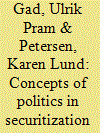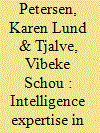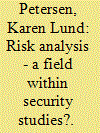|
|
|
Sort Order |
|
|
|
Items / Page
|
|
|
|
|
|
|
| Srl | Item |
| 1 |
ID:
109586


|
|
|
|
|
| Publication |
2011.
|
| Summary/Abstract |
The article argues that there are a number of concepts of politics in play in the current debates on securitization theory and that greater awareness regarding these conceptual differences helps clarify not only theoretical differences but also the possibilities for new theoretical development and reflection. The article identifies three conversations on politics: first, a conversation on how politics concerns action and intentionality; second, a conversation on the modern organization of politics, spheres and sectors; and, third, a conversation on the relationship between politics, ethics and science. Where the first and third conversations refer to politics as an act, in the second conversation politics is inherently tied to the institutional or spatial structures of government - the state, the public, the political field, spheres, sectors or function.
|
|
|
|
|
|
|
|
|
|
|
|
|
|
|
|
| 2 |
ID:
164181


|
|
|
|
|
| Summary/Abstract |
The emergence of a more elusive and uncertain threat environment has transformed the nature of intelligence, increasing its reliance on civil society partners. Once the work of an insular and carefully select few, intelligence production is now a networked, partially open and extensively public–private enterprise. Most poignantly, new practices of public–private ‘collection’ face Western intelligence services with novel questions about control and accountability – questions to which the services have responded with hopes that by standardizing ‘methodologies’, central command may be retained. Suggesting a more complex picture, this article argues that ‘managing uncertainty’ imply forms of interpretation and choices which cannot be pre-empted by rule-regulation: more than Weber’s ideal of the procedural and rule-bound, it may be his (once central, yet largely marginalized) emphasis on institutional and individual capacities for critical ‘judgment’ that is of relevance today.
|
|
|
|
|
|
|
|
|
|
|
|
|
|
|
|
| 3 |
ID:
163728


|
|
|
|
|
| Summary/Abstract |
This special issue is based on the observation that today’s intelligence services stand before a difficult task of, on the one hand, having to manage the uncertainties associated with new threats by inviting civil actors in to help, while also, on the other hand, having to uphold their own institutional authority and responsibility to act in the interest of the nation. In balancing this task, we show how today’s intelligence practices constantly contests the frontiers between normal politics and security politics and between civil society and the state. In this introduction we argue that these changes can be observed at three different levels. One is at the level of managerial practices of intelligence collection and communication; another is in the increased use of new forms of data, i.e. of social media information; and a third is the expansion of intelligence practices into new areas of concern, e.g. cybersecurity and the policing of (mis-) information.
|
|
|
|
|
|
|
|
|
|
|
|
|
|
|
|
| 4 |
ID:
117916


|
|
|
|
|
| Publication |
2012.
|
| Summary/Abstract |
The academic environments of risk analysis and security studies had hardly 'spoken' to one another until recently. The two fields of study were defined within different academic disciplines: security studies a matter for International Relations (IR), and risk studies a matter for sociology, economics and the natural sciences. Increased focus on catastrophic events (terrorism, climate change, etc.) seems to have given the fields of security studies and risk analysis a common empirical theme and highlighted the need for a common research agenda. This article explores the intersection between these two fields of study, as it investigates how the 'old' disciplinary debates on risk have been translated 'into' security studies - to predict, criticize or evaluate the current political practice of security. Such analysis provides a much-needed overview of the risk debates within security studies and brings out the limits of this debate in light of the broader and much more historically settled risk debates within sociology, economics and anthropology.
|
|
|
|
|
|
|
|
|
|
|
|
|
|
|
|
| 5 |
ID:
083061


|
|
|
|
|
| Publication |
2008.
|
| Summary/Abstract |
This article discusses the role of the private company in the fight against terrorism. It argues that the private company has become politically important to counterterrorism efforts, but the economic logic guiding the risk thinking of private companies is hardly compatible with the aim of providing national security. By examining whether and in what manner the risk of terrorism is considered a corporate responsibility, the article seeks to answer whether and how the political role ascribed to the company finds any resonance in the risk practice of private companies. The article approaches this question by examining how Danish food and infrastructural companies conceptualize the relationship between terrorism risks and corporate responsibility. It demonstrates that a distinction between safety and security discursively facilitates an exclusion of national security concerns from the concept of Corporate Social Responsibility (CSR) and thereby works to deresponsibilitize the company in the fight against terrorism.
|
|
|
|
|
|
|
|
|
|
|
|
|
|
|
|
| 6 |
ID:
084695


|
|
|
| 7 |
ID:
163729


|
|
|
|
|
| Summary/Abstract |
Communication aimed at the public has been an almost absent topic in intelligence studies. This is despite a growing recognition of the importance of communicating towards the public in preventive security, counterterrorism, cyber security and organized crime prevention. This article attends to the practice of communicating intelligence to the public. It does so in order to show the diversity of communication practices in Western intelligence today. By investigating how the intelligence community communicates about ‘communication’ to the public, the article identifies three different concepts of communication, that each exposes different understandings of the public and democratic concerns.
|
|
|
|
|
|
|
|
|
|
|
|
|
|
|
|
|
|
|
|
|